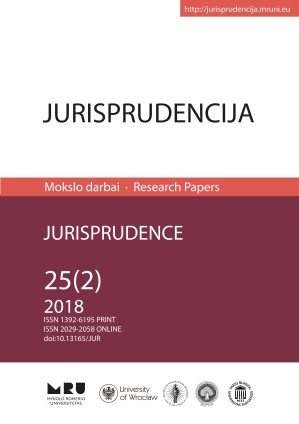MUITŲ TEISĖS PAŽEIDIMAS KAIP NUSIKALSTAMA
VEIKA: KOKĮ KRIMINALIZAVIMO MODELĮ TURIME?
CUSTOMS INFRINGEMENTS AS A CRIME: WHAT KIND OF CRIMINALIZATION MODEL DO WE HAVE?
Author(s): Oleg FedosiukSubject(s): Law, Constitution, Jurisprudence, Criminal Law, Criminology
Published by: Mykolas Romeris University
Keywords: smuggling; customs fraud; the unlawful non-export of goods or products from the Republic of Lithuania; model of criminalization of customs infringements;
Summary/Abstract: This article analyzes the Lithuanian model of criminalization of customs infringements, assessing it in accordance with the harmonized customs supervision system in the European Union, as well as in terms of consistency, reasonableness and proportionality. Questions of legality and control of the movement of goods across borders are common and obligatory to all countries of the European Union, therefore Lithuanian national legislation should be consistent with this legal regulation as much as possible, not to oppose it. This is also relevant for codes that lay down administrative and criminal liability for non-compliance with the common rules and procedures applicable to goods entering or leaving the customs territory of the Union.The Criminal Code of the Republic of Lithuania contains three norms establishing criminal liability for customs infringements: 1) smuggling (Art. 199); 2) customs fraud (Art. 199); 3) the unlawful non-export of goods or products from the Republic of Lithuania (Art. 200). All these crimes are classified as less serious and serious and this shows a great concern of the legislator about the damage caused by these infringements and the desire to insert in the norms a very strong element of dissuasion. In legal literature, this aspect of the existing criminal regulation is sometimes criticized due to excessive sanctions. On the other hand, in the public legal discussion there are no comments on the coherence and validity of the criminalization model established in the criminal legislation, whether all criminalized acts in this area really deserve a status of crime and properly aligned with the fact of belonging of the Republic of Lithuania to the common customs territory of the European Union and the Union Customs Code regulation. The article mostly focuses on these issues.The author of the article has drawn the following conclusions: 1) in the system of three norms that criminalize customs infringements can be seen both positively evaluated and preserved, as well as non-systemic and exclusionary features. Some of them may lead to excessive criminal liability, while others, on the contrary, leave room for legal gaps; 2) the status of customs offence deserves acts related to an attempt to avoid or mislead customs supervision in order to obtain unlawful tax benefits of a fixed amount. Other violations should lead to non-criminal sanctions. The model of criminalization should include avoiding and deceiving both the “external” customs supervision (applied at the border of EU customs union) and “internal” EU customs supervision (applied at the territory of EU customs union). The criterion, which establishes the basis for criminal liability for smuggling and other customs offenses, should be related with the evaded tax burden, but not with the value of transported goods and items. This criterion should be solid enough to not devalue the institute of criminal liability and consistent with general criminal legislation on tax evasion; 3) the possibility of imposing criminal liability solely for a lack of permission to transport some special kind of items across the state border (regardless of the value of the goods and status of goods under customs supervision), set in the norm of smuggling (art. 199), does not comply with the principle of proportionality; 4) the application of criminal liability for the non-declaration of cash when crossing the borders with non-EU countries, set in the norm of smuggling (art. 199), regardless of the origin of money and the purpose of the carriage, does not comply with the requirement of proportionality and aims of criminal law; 5) limitation of the subject of customs fraud (art. 199-1) to only goods brought to Lithuania from another European Union country unjustifiably restricts the scope of the norm, which does not cover violations of special procedures (customs warehousing, free zones, temporary admission, end-use, inward and outward processing) applicable to goods brought directly from third countries; 6) all customs related crimes can be merged into one article of the Criminal Code and included into section of financial criminal offenses.
Journal: Jurisprudencija
- Issue Year: 25/2018
- Issue No: 2
- Page Range: 333-356
- Page Count: 24
- Language: Lithuanian

